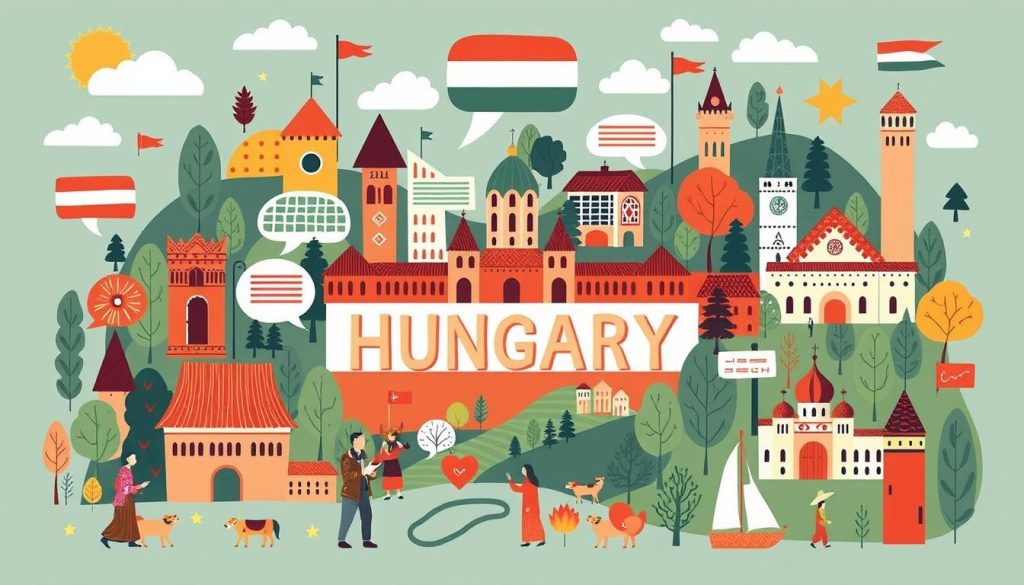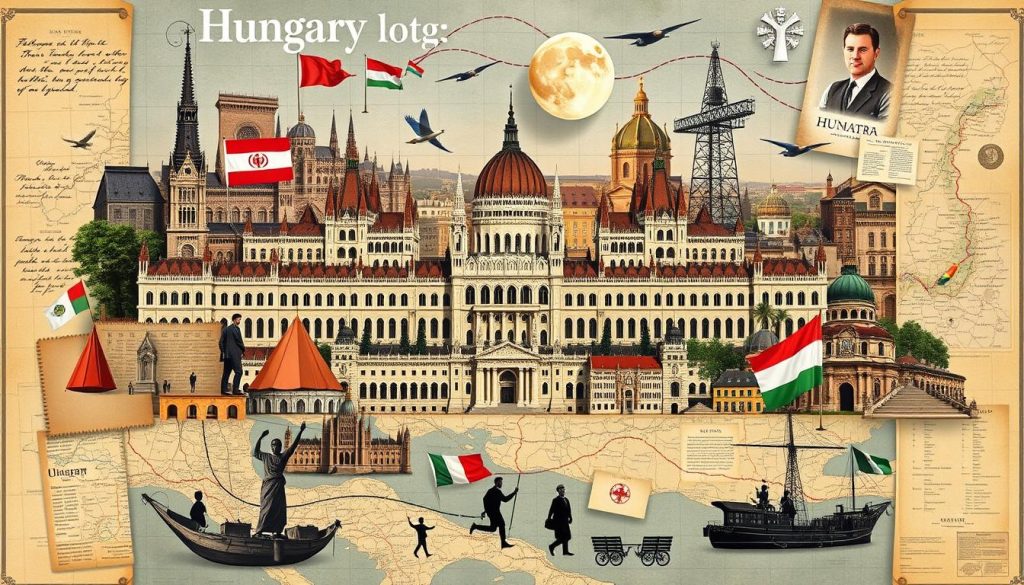Getting to know the business culture in Hungary is key for international professionals. It’s crucial for setting up successful operations in this lively market. This part explores the subtleties of corporate etiquette and why building strong business relationships matters.
By adopting local customs and social norms, business leaders can improve their interactions. This leads to better collaborations and partnerships.
Understanding Hungarian Corporate Etiquette

Knowing how to act in business in Hungary is key. Professional behaviour is very important. There are a few main ways to act right in work settings.
Being on time is crucial. Showing up on schedule shows respect. Being late is seen as unprofessional. So, make sure to plan meetings well to arrive on time.
Being polite is also vital. It’s common to use formal titles and surnames until you’re told it’s okay to be more casual. This shows respect and helps keep things professional.
It’s important to keep a professional image. In talks, stay away from personal topics, especially at first. Stick to business matters to build strong professional ties.
Gifts are also part of business interactions. It’s good to know what’s expected. Gifts should be modest and thoughtful, helping to build good relationships.
In short, understanding these etiquette rules helps you get along better. It shows you value Hungarian business ways.
The Importance of Relationships in Business

In Hungary, building strong business relationships is key to success. Trust and familiarity lead to successful partnerships. They often decide the success of deals and collaborations.
Networking in Hungary means going to various events to meet potential partners. It’s crucial to meet face-to-face. This helps understand each other’s values and goals better. Trust grows slowly, which is vital before any deal is made.
Also, investing in relationships can lead to lasting partnerships. It’s smart to follow up after meetings and stay in touch. A good network in Hungary opens doors to valuable resources and insights.
Business Culture in Hungary

Understanding Hungarian business culture is key to success in this lively market. It has unique traits that shape how businesses work and professional ties are formed.
Key Characteristics of Hungarian Business Behaviour
Hungarian business culture has distinct features that guide corporate interactions. These include:
- Formality: A formal approach is often preferred, especially in first meetings.
- Structure: Hungarian businesses have a clear hierarchy, which affects decision-making.
- Punctuality: Being on time shows respect and professionalism with colleagues and clients.
- Detailed Planning: Well-prepared meetings with structured agendas are highly valued.
Significance of Trust in Professional Connections
Trust is crucial in Hungarian business. Building trust takes time and effort, impacting negotiations and partnerships. Mutual respect and reliability are key to strong partnerships. Trust is deeply rooted in Hungary’s history and culture, making sincerity and integrity vital in business.
Effective Communication Styles in Hungary

Knowing how to communicate well in Hungary is key for business success. The mix of direct and indirect ways of talking is important. It affects how messages are sent and received. Understanding these differences helps avoid misunderstandings and builds stronger connections.
Direct vs. Indirect Communication
Hungarians like clear and honest talk in business. Being straightforward builds trust and makes things more efficient. But, sometimes you need to be more subtle, especially when the context matters a lot. Knowing when to use direct or indirect communication helps you talk with care and precision.
Non-Verbal Cues and Their Impact
Body language, eye contact, and gestures are crucial in communication. In Hungary, looking someone in the eye shows you’re serious and honest. But, crossing your arms might seem like you’re hiding something. Getting these non-verbal signals right helps you communicate better in business.
Meeting Etiquette and Conduct

In Hungary, meeting etiquette is key to making business meetings run smoothly and with respect. A firm handshake is the standard greeting. It’s important to greet everyone individually and use their titles, showing respect and professionalism.
Being on time is very important. Arriving on schedule shows you’re serious and committed to the meeting.
It’s common to have an agenda before the meeting. A clear agenda helps everyone prepare and keeps the discussion focused. Sticking to the agenda ensures the meeting stays on track and productive.
Active listening and respecting who speaks next are crucial. Everyone should wait for their turn and contribute positively. This improves the quality of the discussion and creates a collaborative environment.
By following these etiquette rules, business meetings in Hungary can be successful and respectful. This ensures everyone’s time and input are valued.
The Role of Hierarchy in Hungarian Businesses

In Hungary, the business hierarchy is key to organisational structure and culture. Knowing this hierarchy is vital for successful interactions and making decisions. Decisions are often made at higher levels, showing the importance of seniority and the chain of command.
Understanding the Decision-Making Process
Decision-making in Hungary is top-down. Leaders at the top make big strategic decisions, with input from others less common. Knowing this helps in smooth interactions, especially when sharing ideas or proposals. Senior executives are expected to consider all options before deciding.
Respecting Authority and Seniority
Authority is deeply respected in Hungarian businesses. It’s important to show respect for the hierarchy in the workplace. Using formal titles and surnames when addressing colleagues or superiors is common. This shows professionalism and meets cultural expectations.
Showing respect for seniority in meetings also strengthens relationships. It creates a respectful workplace environment.
Time Management and Punctuality Expectations

In Hungary, being on time is key to showing respect and professionalism. Showing up late is seen as a big no-no. It can harm your business relationships. This shows how crucial good time management is for smooth work interactions.
To do well in business schedules, try these tips:
- Book meetings early to make sure everyone can attend and is ready.
- Have clear plans and goals for each meeting to get the most out of it.
- Make time for talks and follow-ups, remembering schedules can change.
- Use reminders and calendars to keep on top of appointments and tasks.
By focusing on time management and being punctual in Hungary, you can build strong relationships. This boosts your credibility and makes you more effective at work.
Work-Life Balance in Hungary’s Corporate World

In recent years, work-life balance has become key in Hungary’s corporate culture. Dedication and hard work are still important for success. But now, there’s a growing focus on personal time and employee well-being.
Companies are working to create a better work environment. They offer flexible hours and remote work options. This helps people balance their work and personal life. It also boosts morale and productivity.
Here are some important steps for a healthy work-life balance in Hungary:
- Encouraging regular breaks to reduce stress and increase focus.
- Promoting mental health awareness through workshops and support systems.
- Implementing family-friendly policies that value personal commitments.
- Facilitating open discussions regarding workload and expectations.
Fostering a work-life balance is good for both employees and companies. It leads to long-term success in Hungary’s corporate world.
Cultural Norms Around Negotiation

Understanding negotiation in Hungary is key. The Hungarian style is direct but also values relationships. Knowing these norms helps in negotiating well.
Strategies for Successful Negotiation
Being well-prepared is essential in Hungary. Learn about your counterpart and have a solid plan. Here are some strategies:
- Build rapport and trust to create a comfortable atmosphere.
- Adopt a flexible approach, ready to adjust strategies as discussions progress.
- Focus on understanding the motivations behind offers and proposals.
- Embrace patience, as negotiations may extend over multiple meetings.
Typical Negotiation Behaviours to Expect
In negotiations, you’ll see certain Hungarian traits. Here’s what to expect:
- A preference for a collaborative atmosphere aimed at win-win solutions.
- Direct communication, yet an undercurrent of contextual sensitivity.
- Deliberate pacing, with a tendency to reflect before responding.
- Emphasis on long-term relationships rather than quick wins.
Dress Code and Professional Image

In Hungary, the dress code for work is usually conservative and clear. Wearing the right clothes shows respect for your colleagues and your job. Knowing what to wear in Hungary can really help you look professional and capable.
Appropriate Attire for Different Business Settings
Different places need different kinds of clothes. Here’s what’s good for various situations:
- Formal meetings and negotiations: For men, a suit, a clean shirt, and a tie are best. Women should wear a smart blouse or a tailored dress.
- Causal business days: On casual days, wear smart trousers or skirts with collared shirts.
- Company events or dinners: For formal events, wear your best business formal clothes. This makes a good impression.
- Outdoor or team-building activities: Choose clothes that are comfy but still look professional. This is important for team activities.
Gifts and Social Responsibility in Business Culture

In Hungarian business culture, giving gifts is very important. It shows respect and goodwill, adding a personal touch to work relationships. Choosing the right gift means thinking about what the person likes and the situation.
Popular gifts often show off local culture, like traditional crafts or food. This shows respect for quality and thoughtfulness.
Social responsibility is becoming more important in Hungarian business. Companies are working with local communities to show they care. This helps their reputation and builds trust, which is good for the future.
They might give to charities or partner with non-profits. This mixes social good with business goals.
Combining gifts with social responsibility makes a big statement. Instead of just giving things, companies should choose gifts that show their values. Supporting local artists or charities shows they care about culture and society.
Understanding Hungarian Holidays and Observances

Hungarian holidays are key to the country’s culture. They shape how people interact and plan their work. For international business leaders, knowing these holidays is crucial to succeed in Hungary.
Some major Hungarian holidays are:
- January 1 – New Year’s Day
- March 15 – National Day
- August 20 – St. Stephen’s Day
- October 23 – Revolution Day
- December 25-26 – Christmas
During these holidays, many businesses might close or work less. This can change usual work plans. Knowing about cultural events like Easter helps build strong work relationships.
Knowing the holiday schedule helps plan meetings and work better. It shows respect for Hungarian culture. This can help build lasting business connections.
The Influence of Historical Context on Business Practices

Hungarian history shapes today’s business world. Important events have changed the economy and how people work together. Knowing this history helps those doing business in Hungary.
The business evolution in Hungary shows a big change. It went from being a communist country to joining the European Union. This change brought new ways of doing business but kept some old values. Companies mix modern methods with traditional ones, making cultural understanding key.
Several factors show how history affects today’s business:
- The old economic systems still shape today’s companies.
- Long-standing relationships are built on loyalty and trust from the past.
- It’s important to respect these histories to build strong partnerships.
In summary, Hungarian history, business evolution, and cultural context make up a complex but interesting mix. Knowing this helps work well with local businesses. It sets a strong base for future partnerships.
Insights from Successful Businesses in Hungary

The Hungarian market is full of chances for businesses that understand the culture. Many local companies have done well by fitting in and building strong ties.
They have learned important lessons:
- Local partnerships are key to gaining trust.
- Being flexible is crucial for different tastes.
- Getting involved in the community boosts loyalty.
Companies like OTP Bank and MOL show how important culture is. They teach us about training staff and dealing with customers. These lessons help new businesses in Hungary.
Final Thoughts on Navigating Business Culture in Hungary
Entering the Hungarian market means understanding its unique business culture. The importance of building relationships, respecting hierarchy, and clear communication is key. Success comes from embracing local customs and showing genuine interest in how business is done here.
Using strategies that fit the Hungarian business scene can help you connect better. Knowing about cultural norms, like how to negotiate and what to wear, helps you avoid problems. This guide is for international businesses looking to succeed in Hungary, a growing investment spot.
Valuing cultural insights and being open to change will help you build strong professional ties. It also sets your business up for success in Hungary’s fast-paced market. Getting to know and work with this rich business culture can lead to great opportunities and growth for both sides.

